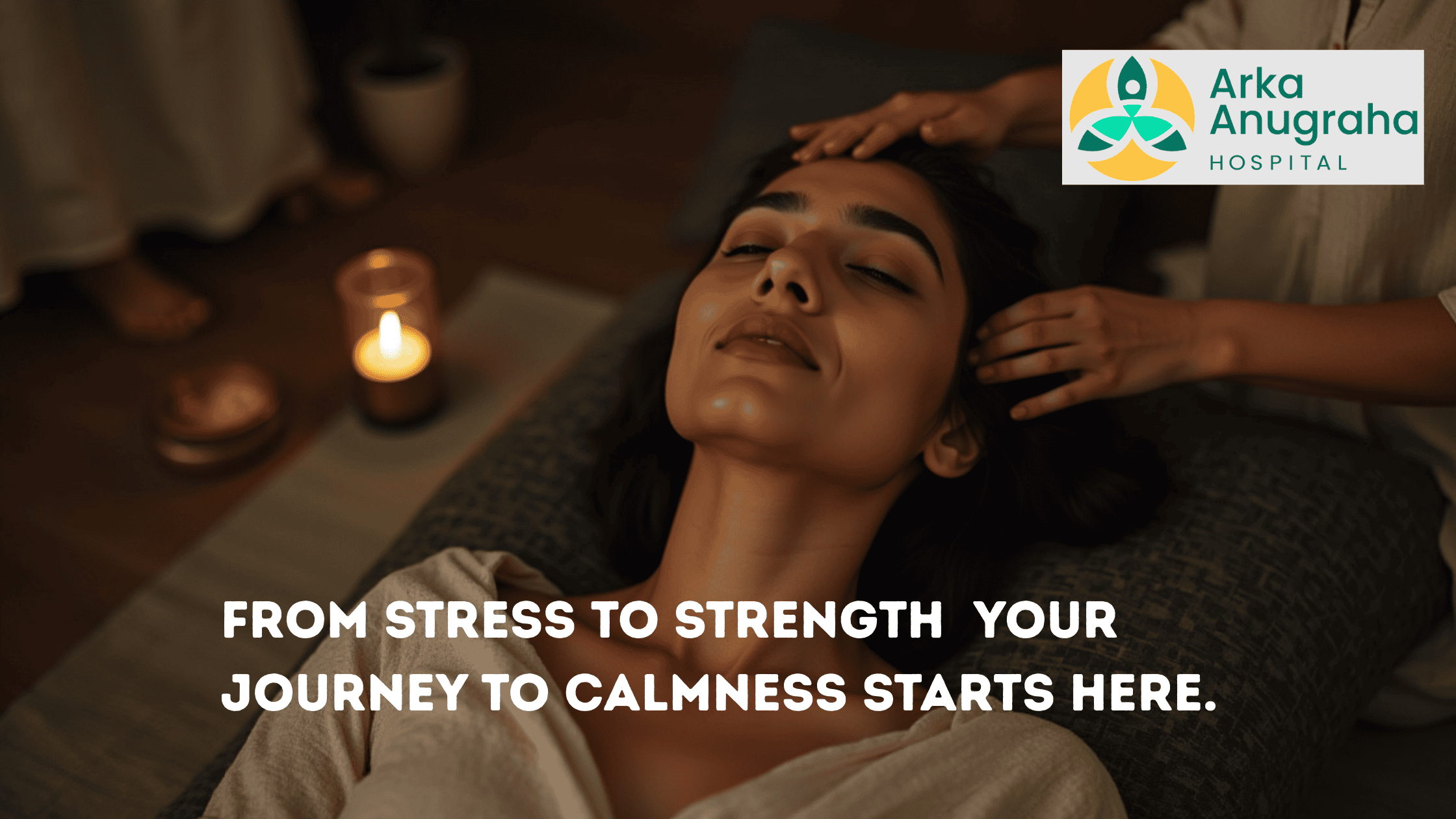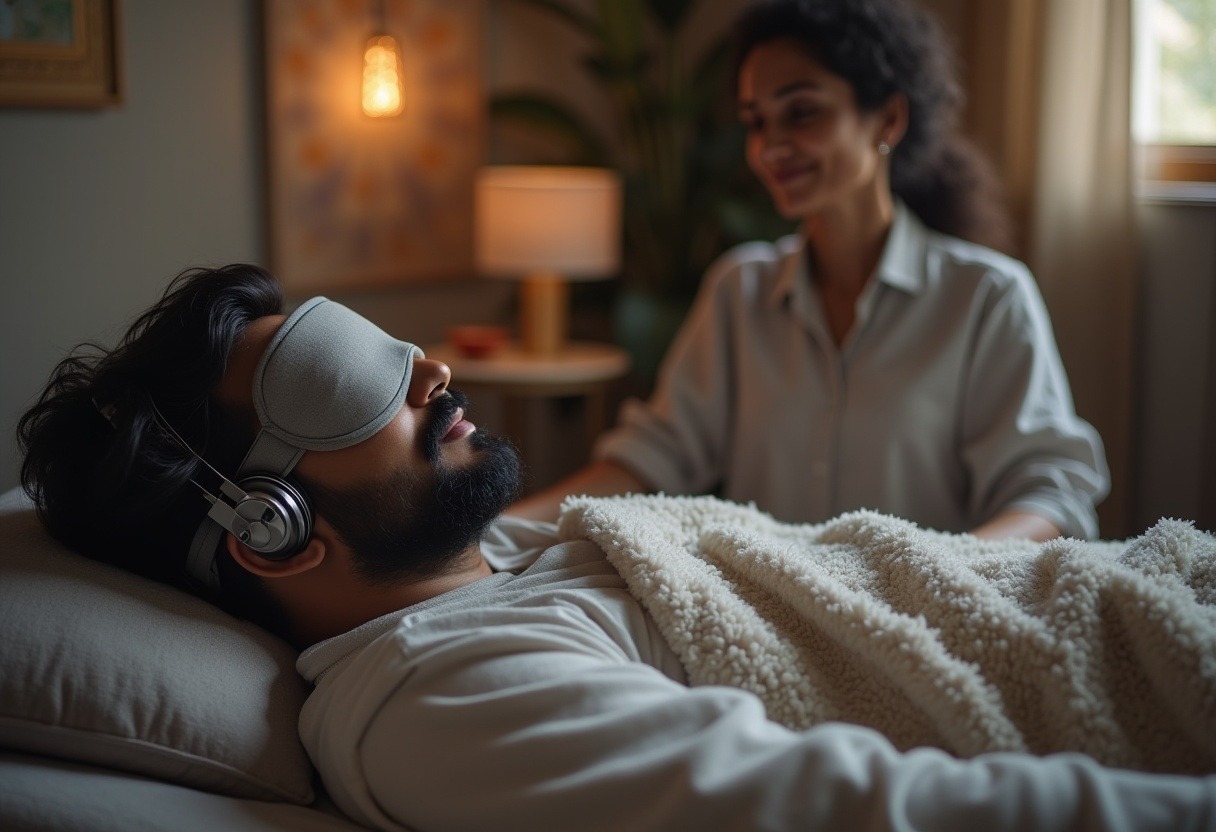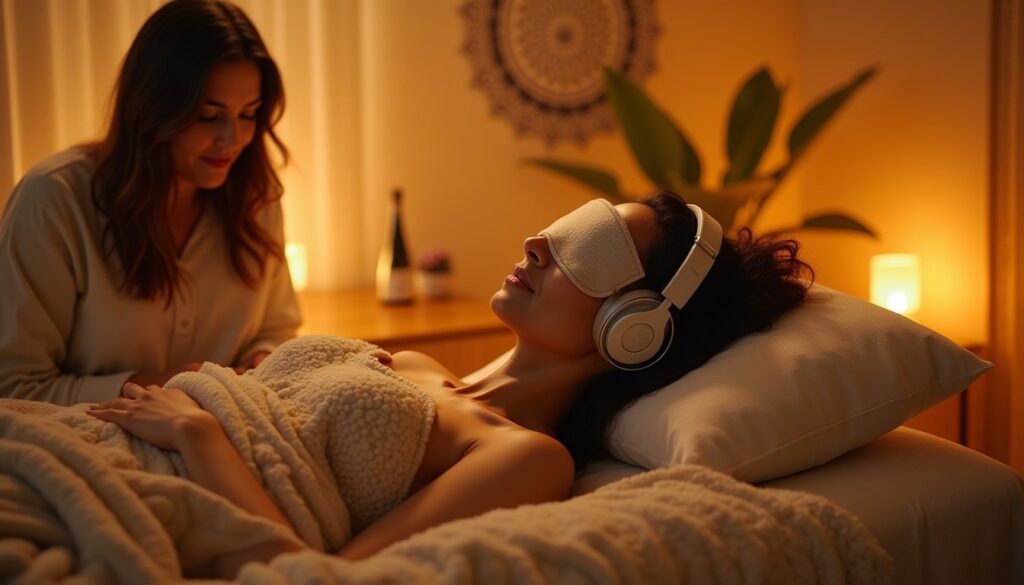

In today’s fast-paced world, anxiety and stress have become all too common, especially in metropolitan areas like Bangalore. The constant hustle, work pressures, traffic jams, and life’s uncertainties can leave anyone feeling overwhelmed. If you find yourself battling anxious thoughts or chronic stress, know that you’re not alone and that there are holistic anxiety therapy options available to help you regain calm and balance.
At Arka Anugraha Hospital’s Integrative Psychiatry service in Bangalore, we take a mind-body approach to anxiety and stress management – blending traditional treatments with natural, supportive therapies. Whether you’re in Bangalore or elsewhere in India, these holistic strategies can empower you to take control of anxiety in a healthy, sustainable way. Let’s explore how combining lifestyle changes, therapeutic techniques, and integrative medicine can make a real difference in managing anxiety and stress.

When anxiety strikes – be it in the form of persistent worry, panic attacks, or stress-related insomnia – the conventional response is often to prescribe anti-anxiety medications or suggest therapy. These can be very helpful, but they might not address the whole picture. Anxiety often has multiple triggers and amplifiers: maybe your thyroid is overactive, maybe you’re deficient in magnesium, perhaps past experiences are keeping your nervous system on high alert, or maybe chronic work stress is pouring cortisol (the stress hormone) into your system daily. A holistic approach to anxiety means we look at all these potential factors together. Instead of just quieting the symptoms, we ask: “What is fueling this anxiety, and how can we help you regain a natural state of calm?”
By treating the whole person, we often uncover solutions that might be missed otherwise. For example, someone might discover that cutting back on caffeine dramatically reduces their anxiety, or that practicing yoga twice a week helps them sleep soundly, which in turn makes them less anxious the next day. Another person might find that talking through their worries in therapy while also taking an herbal supplement like ashwagandha (a calming adaptogenic herb) gives them far better relief than either alone. Each individual is unique, so a holistic strategy is like having a toolbox with many tools – we can pull out the right combination for you.
In Bangalore, and across India, more people are seeking holistic anxiety therapy centers that offer such integrative care. These centers (including our own at Arka Anugraha) recognize that mind, body, and environment are deeply interconnected. We aim to not only reduce your anxiety symptoms, but also enhance your overall wellbeing and resilience to stress in the long run.
This approach complements standard care (like antidepressant medications or talk therapy) with additional therapies that support your body and mind. The goal is to create a personalized depression treatment plan that might include diet changes, stress-reduction techniques, advanced therapies like TMS or ketamine, and more – all working together to lift your mood and restore balance. It’s about treating the person, not just the diagnosis. For someone seeking depression treatment, especially if you’ve tried medications before or prefer natural options, integrative psychiatry offers a more comprehensive healing journey.
Laparoscopy, derived from the Greek words “lapara” (meaning “flank” or “side”) and “skopein” (meaning “to examine”), was initially developed in the early 20th century as a diagnostic tool. It involved making a small incision and inserting a rigid tube with a light source and camera to view the abdominal cavity. However, it wasn’t until the 1970s that laparoscopy truly began to take shape as a surgical technique.
First, it helps to understand what anxiety and stress do to the body. When you’re stressed or anxious, your body goes into “fight or flight” mode – an ancient survival response. Stress hormones like adrenaline and cortisol spike, making your heart race, breathing rapid, and muscles tense. In short bursts, this response can help you handle challenges. But in today’s world, many of us live in a state of chronic stress – the body’s alarm never fully turns off. This can lead to constant anxiety, irritability, fatigue, and even physical issues like high blood pressure or digestive problems.
Holistic strategies aim to reset your nervous system from this overdrive state. We want to activate the “rest and digest” mode (the parasympathetic nervous system) which is the opposite of fight-or-flight. When that system is in charge, you feel calm, your heart rate normalizes, digestion improves, and your mind can think clearly. Techniques like deep breathing, meditation, and certain forms of biofeedback are directly aimed at switching on this relaxation response. Over time, with practice, you can train your body to not react so intensely to stress triggers, meaning even if life around you is hectic, internally you maintain more peace. This is a skill that anyone can learn with guidance and consistency.
Now, let’s dive into some key holistic strategies for managing anxiety and stress, many of which we use in our integrative psychiatry program in Bangalore. Remember, the goal is to find what combination works for you – there’s no one-size-fits-all, but there is hope for everyone to feel better.

One of the most powerful tools against anxiety is mindfulness meditation. Mindfulness is the practice of focusing on the present moment – observing your thoughts and feelings without judgment. When anxiety hits, our minds often race into the future, imagining worst-case scenarios. Mindfulness teaches us to gently pull our attention back to here and now, often by using the breath as an anchor. Over time, meditation can reduce anxiety by changing how the brain responds to stress. It’s not instant – think of it like building a muscle. But even a few minutes a day of deep breathing or meditation can start to make a difference. Many people find that starting their morning with a short meditation or using a guided meditation app at bedtime significantly lowers their daily anxiety levels.
Yoga is another fantastic holistic strategy for managing stress. Not only does yoga incorporate mindfulness and breathing, it also releases physical tension and improves flexibility and strength. For anxiety, we don’t necessarily mean intense, gym-style yoga workouts; even gentle Hatha yoga or yoga nidra (a form of guided yogic relaxation) can be extremely calming. Research has shown that yoga can lower cortisol levels and reduce symptoms of anxiety and depression. Plus, it’s accessible – you can do basic stretches and poses at home on a mat. In Bangalore, we’re fortunate to have a culture that already values yoga; at our center, we often introduce anxious patients to simple routines or recommend local yoga therapy for stress classes. Combining yoga and meditation therapy for stress creates a one-two punch against anxiety: you move your body to work off nervous energy and then calm your mind to find inner peace.
If you’re new to these practices, start small. For example, try deep belly breathing (diaphragmatic breathing) whenever you feel panic rising: inhale slowly through your nose, let your belly expand, then exhale slowly through your mouth. Do this for a couple of minutes. This sends a signal to your brain that you’re safe, helping to shut off the adrenaline rush. You can also practice progressive muscle relaxation – consciously tightening and then releasing each muscle group in your body from head to toe. This exercise helps you distinguish between tension and relaxation, so you can let go of the tightness you might not even realize you’re holding onto during stress.
For those dealing with severe anxiety or trauma-related stress, our hospital offers Holotropic Breathwork sessions as well, which is a more intense form of breathwork that can help release deep emotional blocks. However, simply establishing a daily habit of mindfulness and some movement (like walking or yoga) is often the best starting point to manage everyday stress and anxiety naturally.
When anxiety is high, lifestyle habits often suffer – you might sleep poorly, skip meals or eat unhealthily, and drop exercise because you feel too tired or tense. However, these basic habits are powerful levers for stress management when you get them right.
Making these lifestyle adjustments isn’t always easy – especially when anxious thoughts sap your motivation – but our team provides coaching and encouragement. We might check in on your progress, celebrate your successes, and help troubleshoot obstacles. Over a few weeks, these healthy habits begin to feel rewarding as you notice anxiety gradually loosening its grip on your life.
Just as with depression, nutrition plays a key role in anxiety. Have you ever noticed feeling jittery after too much coffee or feeling more irritable when you’ve skipped a meal? What we eat (and when we eat) can significantly impact our nervous system. A holistic anxiety treatment plan always looks at diet.
One common factor we address is blood sugar stability. When you go too long without eating, or consume a lot of sugary foods/drinks, your blood sugar can spike and crash. Those crashes trigger stress hormones (like adrenaline) which can mimic and worsen anxiety symptoms – you might get shaky, heart pounding, or dizzy, which can even trigger panic in some people. To avoid this, we advise eating regular, balanced meals. Incorporate protein, healthy fats, and complex carbs in each meal to keep blood sugar steady. For example, instead of just having idli (which is mostly carbs) for breakfast, add a side of peanut chutney or an egg for protein; or have a handful of nuts with your fruit snack. Little changes like this can prevent those mid-day energy crashes and keep your mood on a more even keel.
We also look at caffeine and alcohol intake. While many of us love our filter coffee or chai, caffeine is a stimulant and can provoke anxiety. If you’re dealing with a lot of anxiety, consider cutting down or switching to decaf or herbal teas (like chamomile, which is naturally calming). Alcohol might relax you in the moment, but it can disrupt sleep and make anxiety worse the next day (the “hangxiety” effect). Moderation is key, and some people choose to avoid these substances while they heal from chronic anxiety.
A nutrient-rich diet supports your nervous system. Magnesium, for instance, is nature’s tranquilizer mineral – it helps relax muscles and nerves. Leafy greens, nuts, and whole grains are good sources, and if needed, we might suggest a magnesium supplement (which can also aid sleep). Omega-3 fatty acids (found in fatty fish like salmon or in flaxseeds and walnuts) are known to support brain health and have anti-anxiety effects. B vitamins (found in whole grains, eggs, and legumes) are critical for neurotransmitter balance; deficiencies in B12 or B6 can cause anxiety and fatigue, so we ensure those are addressed. Our functional nutritionists at Arka Anugraha can guide you through a nutrition plan that emphasizes these calming, nourishing foods. We sometimes even use Intravenous nutrition for patients who are very depleted or have malabsorption issues – for example, an IV infusion of magnesium and B vitamins can quickly alleviate symptoms in someone who’s very deficient and anxious.
Importantly, we also consider the gut-brain connection for anxiety. Your gut health can influence your mood and stress response. If you have chronic digestive issues (like IBS) along with anxiety, it’s possible that healing your gut could ease your mind. We might suggest probiotic or fermented foods to increase the good bacteria in your gut. These “good bugs” produce calming neurotransmitters and reduce inflammation. In fact, certain probiotics are now dubbed psychobiotics for their positive effect on mental health. For example, Lactobacillus and Bifidobacterium strains in the gut can help modulate stress hormones. While more research is underway, there’s no harm in adding foods like curd, buttermilk, fermented pickles, or kombucha to your diet and seeing if your anxiety improves. We’ve had patients who reported feeling less anxious and more clear-headed after a month of tending to their gut health and diet – it’s quite remarkable but makes sense given how interconnected our body systems are.
Holistic anxiety management doesn’t mean we ignore psychological therapies. In fact, counseling and therapy are incredibly important – but we integrate them with all the other strategies for maximum benefit. At our hospital, you have access to experienced therapists who can guide you through techniques like Cognitive Behavioral Therapy (CBT).
CBT is a well-proven therapy for anxiety; it helps you identify and challenge negative thought patterns and beliefs that fuel your worry. For example, if you tend to catastrophize (“If I make a mistake at work, I’ll get fired and everything will collapse”), a CBT therapist works with you to question that thought and replace it with a more balanced one (“Everyone makes mistakes; I can fix it and it doesn’t mean I’ll be fired”). Over time, this retrains your thought habits, so anxiety isn’t triggered as easily by the same situations. We often combine CBT with mindfulness techniques, teaching you to observe anxious thoughts without getting swept away by them.
For those with deeper trauma contributing to anxiety (say, past abuse or an accident), we have trauma-informed therapists who might use methods like EMDR (Eye Movement Desensitization and Reprocessing) or somatic experiencing to gently work through those memories. Releasing trauma can dramatically lower a person’s baseline anxiety and reactivity.
A very interesting tool we offer in our integrative toolkit is Neurofeedback. Neurofeedback is essentially biofeedback for the brain. You wear a non-invasive cap or sensors that read your brainwave activity, and you play a sort of computer game that gives your brain real-time feedback. Over sessions, this can train your brain to shift into calmer brainwave patterns. Think of it like exercise for your brain’s self-regulation. It has shown good results for anxiety, as well as insomnia and ADHD. The process is relaxing – you might just watch soothing visuals or listen to music that adjusts based on your brain activity. Over a number of sessions, many people report feeling more resilient to stress and less prone to anxious spirals. Neurofeedback essentially helps your brain practice staying in a focused, calm state, and those skills carry over into daily life. We’ve had clients who, after a course of neurofeedback, find that situations which used to trigger panic (like driving in traffic or speaking in meetings) no longer do, or at least the intensity is much lower. It’s a gentle, side-effect-free method and can be a great add-on to therapy.
Another cutting-edge aspect of our program is Vagal Nerve Stimulation (VNS) techniques. The vagus nerve is a key part of the parasympathetic “rest and digest” system, and stimulating it can reduce anxiety. We often teach simple VNS exercises like humming, gargling, or specific breathing patterns that naturally activate the vagus nerve. In some cases, we use non-invasive VNS devices that gently stimulate the nerve through the skin. Strengthening your vagal tone (how responsive your vagus nerve is) can improve your heart-rate variability and overall stress resilience.
It’s fascinating science – for instance, have you noticed some people faint or puke when stressed? That’s the vagus nerve overreacting. By training it, we aim for a balanced response instead of an all-or-nothing. Improved vagal tone has been linked to better mood, digestion, and even immunity, so it’s a truly holistic target.
Many individuals ask us about natural remedies for anxiety: things like herbal supplements or Ayurveda or homeopathy. Our approach is to use evidence-backed remedies as complements to the strategies above. For instance, Ashwagandha, an Ayurvedic herb, has been shown in studies to lower stress and cortisol levels. We sometimes recommend a high-quality Ashwagandha extract to patients with chronic stress, as it’s generally safe and well-tolerated. It can gently support your adrenal glands (which pump out stress hormones) and help your body adapt to stress better – that’s why it’s called an “adaptogen.” Other calming herbs we might use include Brahmi (Bacopa), which can improve anxiety and cognitive function, and Chamomile, often taken as a tea, which has mild sedative and anxiety-relieving properties.
Magnesium supplements (as mentioned earlier) can have a tranquilizing effect on the nervous system. L-theanine, an amino acid found in green tea, is another supplement that can promote relaxation without drowsiness – some people take it to take the edge off anxiety during the day. These natural options can be quite effective when used appropriately, and we incorporate them as needed in a personalized plan. Of course, any supplements are used judiciously, considering any other medications you might be on (to avoid interactions).
Another natural modality is acupuncture, a part of traditional Chinese medicine. Some patients find that acupuncture sessions help reduce their anxiety, improve sleep, and balance their energy. In our integrative network, we have referrals to trusted acupuncturists in Bangalore for those interested. Acupuncture involves inserting very thin needles at specific points on the body to regulate the flow of energy (“Qi”) and can stimulate the body’s natural painkilling and relaxing chemicals. It’s an option one can explore as part of a holistic plan.
Finally, spending time in nature is a terribly underrated but powerful stress medicine. Even a short walk in a garden, tending to plants, or sitting by a lake can lower stress hormones. In a city, we might not always have immediate access to wild nature, but Bangalore’s gardens or even a balcony with plants can be your daily mini-retreat. We encourage patients to find what we call “micro-moments of peace” – small pockets in the day where you disconnect from devices and reconnect to something calming (nature, music, prayer, art, anything that soothes your soul). These moments act like pressure valves, preventing stress from building up too high.
Consider Anita, a 36-year-old entrepreneur from Bangalore who came to us with debilitating anxiety and burnout. She was juggling a start-up business and family, working 12+ hour days, and found herself constantly on edge. Anita experienced palpitations, digestive upsets, and nightly insomnia. She didn’t want to rely on anti-anxiety medication long-term, so we crafted a holistic plan for her. First, we did a thorough check-up – found her thyroid was slightly imbalanced and vitamin B12 was low, which can contribute to anxiety symptoms. We started her on a B12 supplement and a gentle thyroid-supportive nutrient. We also asked her to track her diet and found she was drinking 5 cups of coffee a day and often skipping lunch. That alone can put the body in panic mode! So we worked out a nutrition plan: cut down to 1 cup of coffee, have protein-rich mini-meals, and stay hydrated.
We paired Anita with a therapist for CBT and limbic system retraining to manage her work stress and anxious thought patterns. Additionally, she began attending our weekly mindfulness meditation and breathwork “USIRU” at the clinic. At first, she found it hard to sit still, but gradually she started enjoying that time as “her hour of calm.” We taught her some quick breathing exercises for moments of panic (like 4-7-8 breathing, where you inhale for 4 counts, hold for 7, exhale for 8). She also underwent limbic system retraining training twice a week, which she described as “brain yoga” – she noticed after a few sessions that she felt more clear-headed and less reactive when a work crisis happened.
Three months later, Anita was a changed person. She was sleeping 7 hours a night (a big improvement from barely 4-5 hours earlier), her gut issues had resolved with regular eating and a probiotic supplement we gave her, and she had tools to manage stress. She said, “Now when I feel anxiety coming, I know what to do – I step away, do my breathing, maybe have some herbal tea, and I can feel my heart rate come down. Before, I thought I was going to collapse or lose control. Now I’m back in control.” She also made lifestyle changes like delegating more at work and taking Sundays off for family and rest, which we had worked on in therapy as part of setting healthy boundaries. This is a great example of how multiple small changes together created a big positive outcome. No single thing was a magic cure – it was the combination of medication adjustments, nutrition, mind-body techniques, and therapy that allowed Anita to reclaim her calm and confidence.
Managing anxiety and stress is a journey, but you don’t have to travel it alone. With the right support and a toolkit of holistic strategies, freedom from constant anxiety is absolutely achievable. At Arka Anugraha Hospital in Bangalore, our integrative psychiatry team is dedicated to guiding you through this journey with compassion and expertise. We believe in empowering you with knowledge – understanding why your body reacts the way it does – and with practical skills to find peace in the midst of life’s storms.
Our approach is both holistic and personalized. Whether it’s teaching you meditation, balancing your nutrition, providing cutting-edge therapies like limbic system retraining, neurofeedback, or simply listening deeply to your concerns, we tailor our care to what you need. We also welcome individuals from across India via our pan-India online consultation services, because we know stress and anxiety have no borders – and neither should relief. If you’ve been searching for ways to manage anxiety that feel natural, supportive, and effective, integrative psychiatry could be the answer you’ve been looking for.
Don’t let anxiety rule your life. With holistic strategies, you can regain control, find calm, and truly thrive. We invite you to take that first step towards a more peaceful mind and a healthier life.
Ready to conquer anxiety and stress the holistic way? Book a Free Discovery Call with us at Arka Anugraha Hospital. Let’s work together to create your personalized plan for inner calm and resilience.
Discover recipes that blend taste with health, crafted by our experts for your well-being.

Discover groundbreaking diagnostic services exclusive to India, now available at Arka Health, Bangalore
Arka Anugraha Hospital dedicated to empower you regarding gut health, detox, weight loss, chronic conditions, metabolic syndrome, diabetes, and obesity.